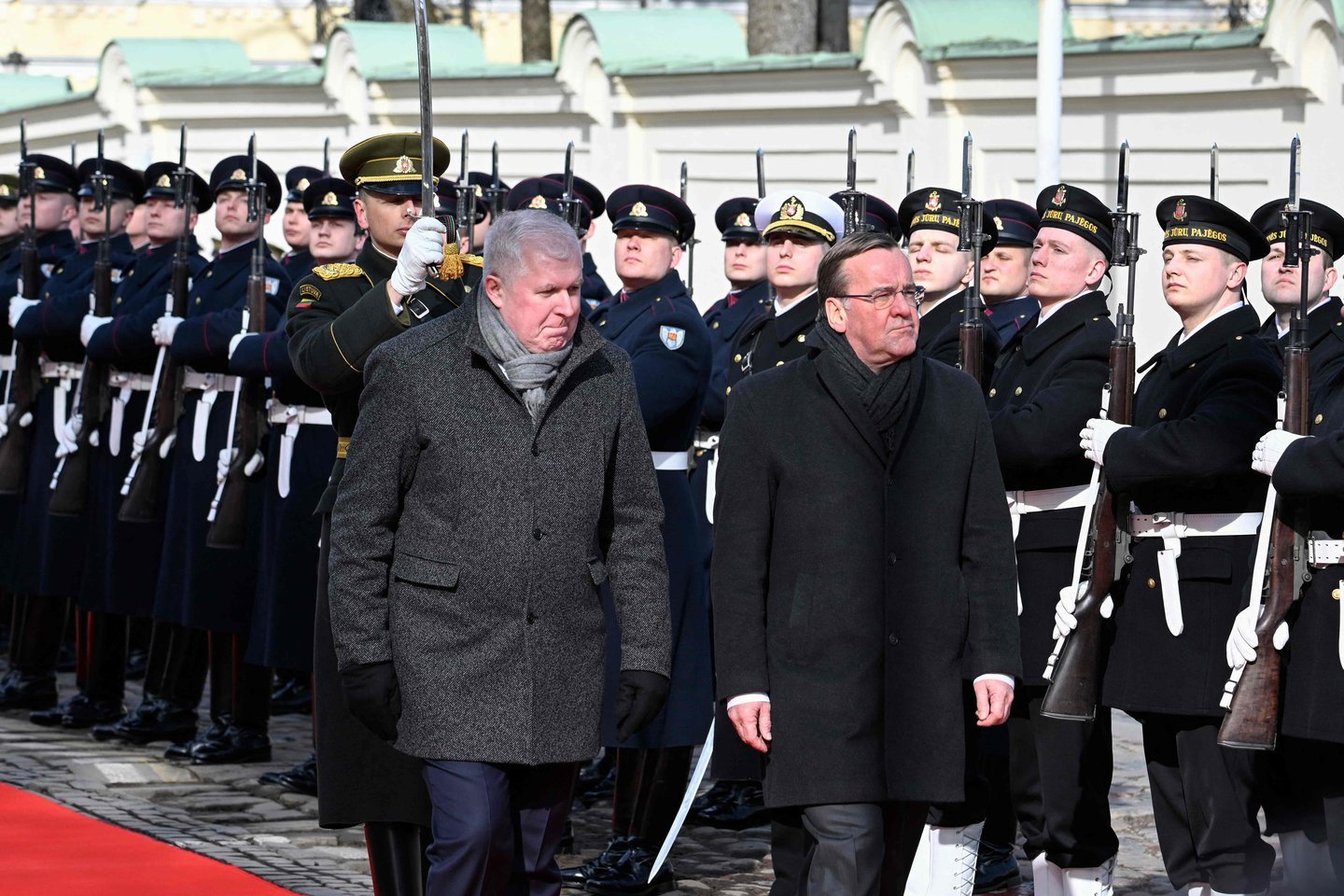That is roughly how the German media summed up the essence of this visit to Lithuania. There were both more detailed comments and detailed accounts of the Minister's trip to the snow-covered forests of Pabradė and his talks with the troops stationed there or taking part in military exercises.
Journalists covering the visit tried to explain to the Germans the danger that Lithuania was in.
„If Russia were to subjugate Ukraine and gain a bigger appetite, the Baltic countries would be in danger. On Russian television, there are daily fantasies about the restoration of the Soviet empire, and Mr Putin does not hide his imperialist ambitions. If he is not deterred, World War III would start about where Pistorius waded through the snow on Tuesday morning,“ writes Die Welt.
„German soldiers would fight and die here“, German journalist Marco Seliger, currently defence and security policy editor at the Swiss daily Neuer Zürcher Zeitung (NZZ), begins his report from the snow-covered forests of Pabrade with an even more dramatic note.
Now „the German armed forces are just learning to refocus on their primary task: defending their country and the NATO alliance. Instead of the desert and heat of Afghanistan, German troops are now preparing for the forests and cold of Eastern Europe“, summarises Mr Selinger's impressions from Lithuania, where hundreds of soldiers of the German army's 41st Mechanised Infantry Brigade are taking part in a training exercise together with the Lithuanian Armed Forces, and where „for the second night already, the German army has spent the night in the Pabradė forest in sub-zero temperatures“.
According to Battalion Commander Alexander Döges, „first, they have to re-learn how to survive outdoors in temperatures close to minus 20 degrees“.
„What life is really like in the fields of Eastern Europe in wartime conditions can now be seen in the videos from Ukraine. Exhausted soldiers with frostbitten fingers and limbs, wounded dressed with improvised bandages – all this is happening a thousand kilometres away from Pabradė. And the military training ground is just a few kilometres from the border with Belarus.“
The terrible reality of war in Lithuania is much closer and much more real than in the West, the NZZ author reminds the reader.
Words of support alone are not enough
The German public needs to understand why Germany is now taking responsibility for the Baltic States. „During the Cold War, the eastern flank was in West Germany“, and now that „flank is in Poland and the Baltic States“, the national media repeatedly quoted Pistorius, adding the Minister's story about Osnabrück, the town of his youth, where British forces were stationed.
According to Die Welt, during his visit to Lithuania, the German Defence Minister repeated at every opportunity: „Our security is also defended in Lithuania“. But declarations of solidarity alone are not enough, stressed almost all the German press who commented on the German brigade.
According to the Frankfurter Rundschau, the situation could even help mend the rift between Germany and its eastern partners, which have „too often had to suffer from the fact that their warnings about Russia have not been taken seriously“. As a result, according to the newspaper, „they now have even more reason to put pressure on Germany“.
Europäische Sicherheit und Technik supports the arguments of Lithuanian Defence Minister Arvydas Anušauskas regarding the German brigade: the geographical position of the Baltic States and their small size require a permanent deployment of troops on site. In the event of a Russian invasion, there would be no time to move troops from Germany to the Baltics.
Last summer, Chancellor Scholz raised Lithuania's expectations by „raising the prospect of deploying such a combat unit with 5 000 additional men and women to defend Lithuania. This was his response to the Russian invasion of Ukraine“, recalls the Süddeutsche Zeitung. Since then, Germany has only permanently stationed a brigade headquarters in Rukla. It consists of about 60 people. The core of the squad is on duty in Germany.
„No need to promise if you can't keep it“
B. Pistorius, as you know, could not promise the permanent deployment of the German brigade, postponing the issue until the NATO summit in Vilnius in June. Marie-Agnes Strack-Zimmermann (FDP) of the Bundestag echoed the Minister's position in an interview with the welt tv channel.
She also spoke not of a permanently deployed brigade but of „more flexible structures“, as if German politicians had agreed to counter the uncomfortable issue of a brigade with this very phrase, „more flexible structures“.
Just as B. Pistorius, the Chair of the Defence Committee, has pointed out that the German brigade is not a German issue but a NATO issue. According to the politician, „NATO is concerned with which country needs to be protected where on the Eastern flank“.
„We have doubled the number of troops deployed in Lithuania from 500 to 1000. But in fact, Russia's invasion of Ukraine has brought the war closer to NATO territory. Lithuania has always told us how dangerous the situation is, but the Grand Coalition of the Federal Republic did not take it seriously. And now Pistorius has to take care of the military replenishment in this difficult situation“, the Free Democrat politician said.
„We have a large number of troops, but the Lithuanian idea of a full brigade, up to 4,000 troops, possibly with families, permanently stationed in Lithuania is something we cannot do,“ Strack-Zimmermann admitted candidly.
Responding to a comment by a welt tv journalist that Germany should not give out promises like solidarity, military equipment, or ammunition so easily at all, the politician said: „Indeed, you should not make promises if you cannot keep them. On the other hand, the pressure we are now facing from Eastern Europe is making us turn faster.“
The Defence Minister will have to correct the mistakes of his comrades
And the turnaround, under Christine Lambrecht, has been turtle-like. This is something that the current Minister Pistorius has also faced in Pabrade. According to Markus Decker of Redaktionsnetzwerk Deutschland, German soldiers stationed in Lithuania told the Minister about technical difficulties with vehicles.
„One of them, referring to a Marder infantry fighting vehicle, which is much older, questioned whether it could withstand weeks of combat. The Minister had to admit that spare parts were sometimes scarce and that the Leopard tanks were 'behind' in maintenance and repair, but that this would be rectified.“
The visit to Lithuania showed Pistorius that the Bundeswehr is still waiting for its „tipping point“ and that, due to huge supply deficits, the army is not able to deliver all the promised equipment – in this case, the state-of-the-art Leopard 2A7 battle tanks – for rapid deployment on the eastern flank of the alliance.
„B. Pistorius belongs to a generation that had already buried the threat of war in Europe. He came from Osnabrück and made his political career in the SPD in Lower Saxony, the German section of the Social Democratic Party, whose most prominent representatives were Gerhard Schröder, Frank Walter Steinmeier and Sigmaras Gabrielius. Pistorius must now correct the mistakes and misjudgments of his comrades. To do so, he will need, among other things, a lot of money that his party would rather spend on other projects,“ the daily Die Welt assesses.
All this cannot be overlooked when considering the deployment of a German brigade in Lithuania. It is at least optimistic that Pistorius, the German Defence Minister, enjoys strong support in the country: polls show that he is currently the most popular German politician.

